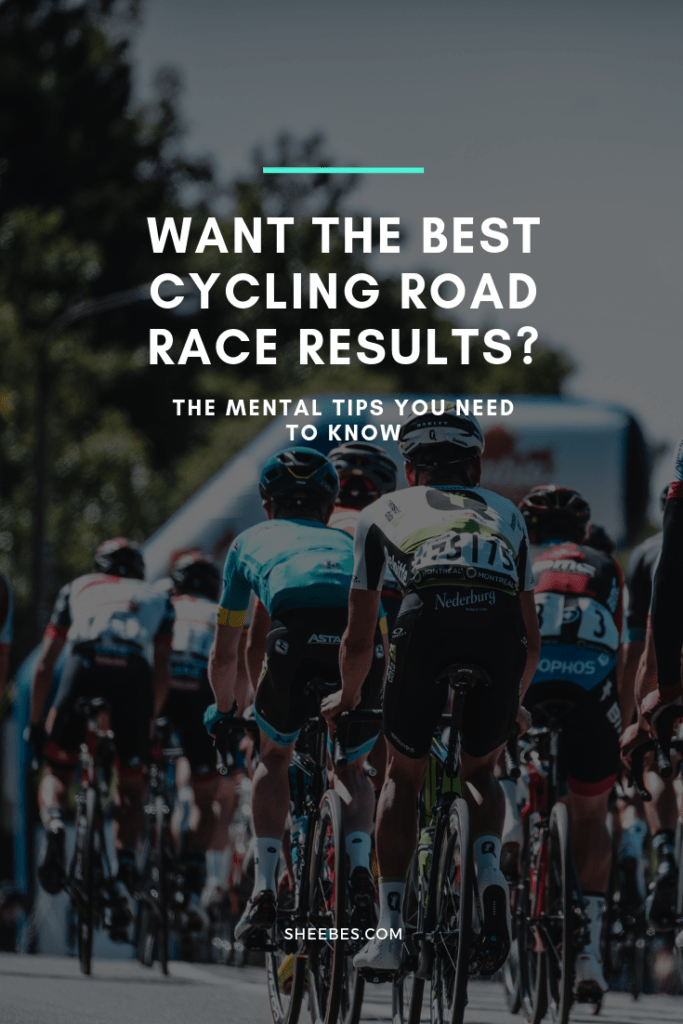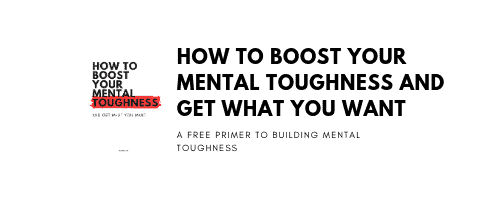Sheebes is here to give mental toughness tips and resources to help you, the endurance athlete, achieve your personal best. To keep the lights on and content free, we are a participant in the Amazon Services program. This means if you click on an affiliate link below, Sheebes will earn a small commission, at no cost to you.
Are you looking for an extra edge to improve your cycling road race results?
If you’ve done everything you can do physically—intervals, strength training, and more—that final edge lies within your mind.
After all, your mind is powerful and your thoughts matter. Because the what you think about impacts your cycling performance.
But what exactly should you be thinking of and focusing on while racing?
We’ve heard we should focus on the process, rather than the outcome, but is that really the best strategy for a road race? Should you merely focus on the process? Or should you focus on a specific technique? Or maybe your performance—beating your personal best?
That’s what a research study aimed to uncover with a group of male cyclists. And the results are surprising.

Should cyclists really focus on the process?
While there were three parts to this study, the findings from Experiment 2, if you were to use them, is the most easily transferable because it wouldn’t require outside help.
In Experiment 2, the main question was:
– What’s the best goal to use during a 5-minute cycling task?
– And, is this goal different for new, experienced, or elite cyclists?
Then, researchers put cyclists to the test.
Cyclists of all abilities—new, experienced, and elite—performed five cycling trials at max intensity for 5 minutes, with 15 minutes of active recovery. And they were told to adopt a specific strategy—process, performance, outcome, or trust—as they pedaled.
Here’s what each of those strategies mean.
Focusing on the process
Cyclists completed the first cycling trial with their normal focus strategy.
Then, they focused on the process, a specific technique, given by researchers:
“For this trial, focus your attention on the pressure through your legs and feet while cycling. Notice how your legs and feet feel through the pedal stroke. Focus all your attention on the pressure through your legs and feet during this task.”
Focusing on performance
To get cyclists to focus on performance and beat their personal best:
“For this trial, your goal is to improve on your initial performance by at least 5%. In the first trial you did today your average power output was [insert Baseline average power]. So your performance target for this task is to achieve an average power output of [insert Baseline power + 5%] or more. Focus all of your attention on achieving this performance goal. “
Focusing on the outcome
Focusing on the outcome required cyclists to concentrate on getting their desired result.
“For this effort, your goal is to beat the best average power output recorded by your group. So far, the best average power output is [insert best average for group]. Your goal is to beat this power output. Focus all of your attention on achieving this goal.”
Trusting your body to do what it needs to do
Finally, in the last 5 minute trial, cyclists were instructed to focus on one black cardboard spot on their handle bar. And, they were told to trust that their body could and would successfully complete this last task.
“During this trial, I want you to plan your strategy, then focus all of your attention on the spot on the handlebars in front of you and trust your body to perform the task. Focus all of your attention on the spot and just allow your body to perform the task automatically.”
The results
The results? For cyclists of all levels, focusing on performance and outcomes yielded better—that is, better average power output—than any other focus.
The one reason why you shouldn’t focus on the process

So why is that? On race day, why shouldn’t you focus on the process instead?
Focusing on the process turns your focus inward, to the pain you may be feeling, disrupting your cycling performance. It highlights and overemphasizes the pain, which may cause you to either ease the pace or stop cycling.
Focusing on a performance or outcome goal balances your internal emotions (exertion, pain) with external cues, such as power output.
Even Olympic cyclists use performance and outcome goals on race day. They’ve said that using goals gave them the focus and motivation needed to cope with pain and achieve a specific performance level during a race.
The bottom line? Cyclists of all levels perform their best if they’re following performance or outcome goals because it balances internal cues (such as pain) with external cues (such as power output).
Here’s what to do to get the best cycling road race results

If you want to push your performance to new heights, choose either a performance or outcome goal.
A performance goal means beating your own performance or achieving your personal best, regardless of how other cyclists are doing. You’re measuring your goal against your own performance.
Basically, a performance goal is you vs. you.
For example, a performance goal might be to improve your average power output by at least 5%. Or, beating your previous race time. This number doesn’t have to be set in stone. In fact, you may even want to set a range for it to avoid disappointment yet increase motivation.
Outcome goals focus on the results of specific events, based on comparing your performance to other racers.
Outcome goals are you vs. others.
For example, where you expect to place in a race. A podium finish? Top ten?
Choose a performance or outcome goal to give you the focus and motivation you’ll need to handle the pain and achieve a specific performance level.
But always, celebrate your effort, regardless of your result
Sometimes you’re riding with the pack and sometimes you’re dropped. It’s the inherent nature of racing. But one thing’s certain—you’ll always have control over how hard you work on any day. So always celebrate your effort.
You did your best, and that is enough.
Have you used any of these goals in a recent bike race? Leave a comment below and let us know.

Sources
Optimising the Performance of Cyclists under Pressure: Attentional Focus and its Role in Performance
Psychological Demands Experienced by Recreational Endurance Athletes
Effects of Different Types of Goals on Processes That Support Performance